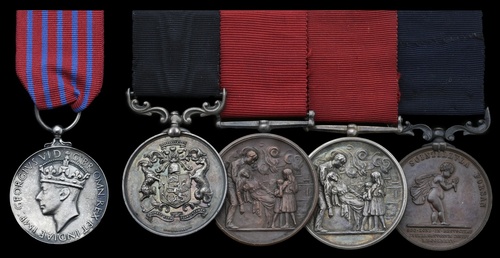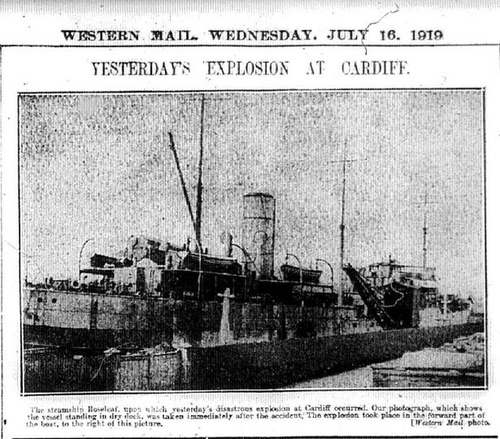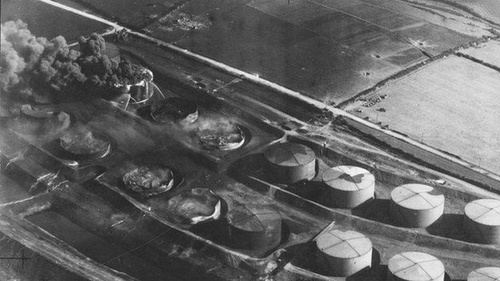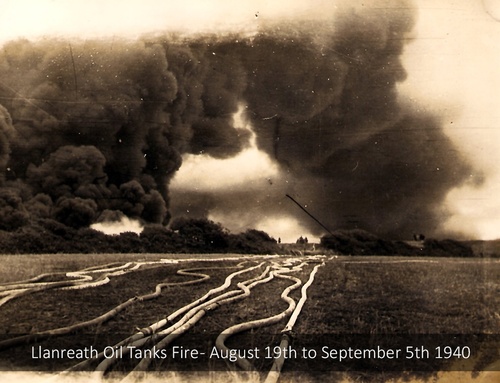Auction: 22003 - Orders, Decorations and Medals
Lot: 452
The superb ‘S.S. Roseleaf’ Humane Society Bronze Medal group of four awarded to Fire Sergeant D. J. Collins, Cardiff City Police and Fire Department, who was thrice decorated for his lifesaving efforts, culminating in the award of the George Medal after the Pembroke Dock bombing
Royal Humane Society, small Bronze Medal (Daniel Collins 15th July 1919); Society For the Protection of Life from Fire, Silver Medal (Daniel Collins, Cardiff 15, July 1919.); Society For the Protection of Life from Fire, Bronze Medal (Sergeant Collins, Cardiff. 21-2-37.); Cardiff City Police & Fire Brigade Medal for Conspicuous Bravery (Fireman James Collins.), mounted as worn, some edge bruising, overall, very fine (4)
[G.M.] London Gazette 22 October 1940, the original recommendation stating:
‘Fire Sergeant Collins showed outstanding qualities of leadership under trying conditions, involving grave risk of personal injury, particularly in the early critical stages of the fire. He withstood showers of hot oil from bomb-splintered tanks for long periods in order to place his jets at strategic points, thus materially aiding the combat of the fire.’
Daniel James Collins was serving as a Fireman with the Cardiff City Police Fire Brigade on 15 July 1919 when the steamer Roseleaf suffered a catastrophic explosion, made all the worse by the fact that the ship was carrying a cargo of oil. She was undergoing repairs in Cardiff Channel Dry Dock at the time and as such the Police Fire Brigade were called out to control the blaze and rescue survivors. Collins- along with Superintendent Moger and Fireman Stanley Blake- was informed that Sixth Engineer Thomas Cosser was still aboard.
The ship was described resembling ‘a fiery furnace’ and further to that there was a threat of gas in the area which added to the danger. Despite this all three firemen, pausing only to put on smoke helmets intended to prevent asphyxiation, made their way to the hold. They found Cosser alive but unconscious and managed to pull him to the hatch where other members of the Police Fire Brigade had assembled to haul him onto the deck. Cosser was taken to Hamadryad Hospital and survived despite his injuries; the Roseleaf disaster took the lives of twelve men although the nature of the explosion was such that little damage was caused to the ship itself. For his actions Collins was awarded the Society for the Protection of Life from Fire Silver medal (Case No. 15,792) and the Royal Humane Society Bronze Medal.
Cymric Buildings - 21 February 1937
Promoted Fire Sergeant Collins was still with the department on 21 February 1937, the day of the West Bute Street fire. Arriving at the blaze in Cymric Buildings, West Bute Street the Brigade busied themselves with fighting the fire on the ground floor. However when a young woman - Ms Murrey, the caretaker’s daughter - emerged from the building, she informed Collins and Superintendent George Bainbridge that her family were still in the building. She had escaped via a flat roof but the rest of the family couldn’t follow - with the young children and an elderly man present. Entering the building by a passenger lift, Bainbridge was able to get most of the family out - however the volume of smoke present made it impossible to get the children out of their bedroom.
Unable to get out via the door the only option was the window; a fire escape was removed from a nearby building and leant against the Cymric Buildings. This was still approximately ten feet too short so lifelines were attached to the children and Collins stood atop the precarious ladder while they were lowered out of the window by Bainridge. In this manner all of the children were removed to a place of safety and, the fires having been brought under control, the adults were able to leave through the building, guided by Mr Murrey the caretaker. The report of the Chief Constable states:
‘The SPLF Bronze medal was awarded to Sergeant Daniel James Collins for his part in the rescue and assistance to Superintendent George A. Bainridge at the above-mentioned fire on the 21st February 1937.’
Pembroke Docks – 19 August 1940
When Luftwaffe bombs struck the Oil Depot at Llanreath, Pembroke they started an 18-day blaze which was only bought under control by the bravery and combined effort of 650 firemen from across Wales and England. During the turmoil five firemen from the Cardiff Fire Brigade were killed, and three more men from that city were awarded the George Medal with only one - Collins- being a regular, the other two being Auxiliaries. The London Gazette citation for the Medals awarded during this incident states the following:
‘The awards for the above mentioned Firemen and Auxiliary Firemen belonging to the various fire brigades are in recognition of the gallant conduct shown by them when attending a very serious fire.
The fire in question was started by hostile air attack and burnt for a considerable period. While it was being fought, there were further air raids, both by day and by night, the firemen being subjected to machine-gunning as well as bombing’
Despite the constant danger they continued to fight the blaze even when, on 22 August, a fuel tank split with a burst of flame that took the lives of five members of the Cardiff Fire Brigade. With the news of the deaths going around the assembled Brigades - at that stage having faw fewer numbers than would join at their height - and constant air attacks from the Luftwaffe, morale was close to breaking point. Nevertheless the firemen continued to work day in, day out, and it was that same day that 100 men from the Birmingham Fire Brigade joined the fight with more and more arriving from across Wales and southern England.
Despite their numbers the work was still appalling, 'Inferno 1940' notes the effect this had on the incoming Brigades:
‘Three days later Mrs. More and her near neighbours watched small groups of them coming back down the road on foot. They were completely unrecognisable from the chaps they’d seen arriving in dashing helmets and spick and span uniforms to “deliver Pembroke Dock from the fiery dragon.”
They were coated with oil and their uniforms were in tatters. Some were being half carried. Others, with bandages swathing their oil-damaged eyes, were being led. They had the appearance of shell-shocked troops… of men who had been to hell and back. A number couldn’t walk at all because oil had got into their boots, and every conceivable form of transport, including motorcycles with sidecars, cars pressed into service to convey men to the casualty stations and rest centres.
No-one was surprised to see so many coming in for care and attention. No-one was surprised at all. Because by then, despite the reinforcements, half of the Llanion oil depot was a furnace of fire.’
It took almost two weeks for the blaze to finally be beaten, and it was Collins - out of all the men of the Cardiff City Fire Brigade - who was awarded the George Medal for his tireless work; sold together with a copy George Medal along with copied research including typed paperwork, recommendations for award and London Gazette entries as well as newspaper and magazine extracts with extracts from Inferno 1940 and Those in Peril.
Subject to 20% VAT on Buyer’s Premium. For more information please view Terms and Conditions for Buyers.
Sold for
£700
Starting price
£350











